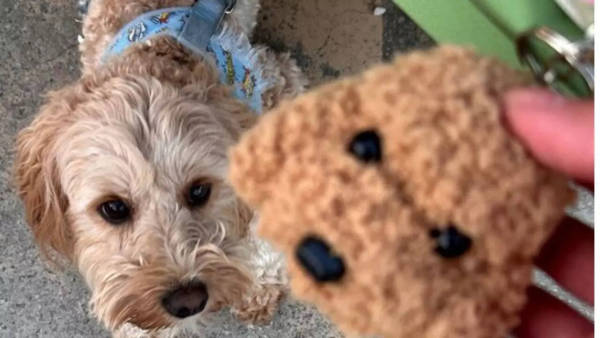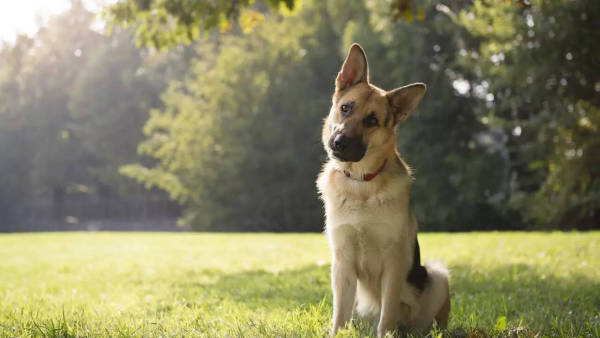
Have you ever called your dog’s name and noticed that adorable head tilt, as if they are trying to understand you? It turns out this behaviour is more than just cute; it is a glimpse into how dogs process human communication. A 2022 peer-reviewed study published in found that dogs respond not only to the sound of words but also to the tone, context, and emotional cues humans use. This suggests that when you say your dog’s name, they are actively interpreting your message and not simply reacting out of habit.
The head tilt often accompanies recognition of their name, showing that your dog is focusing, processing, and attempting to respond in a way that strengthens your connection.
How dogs learn their name and tilt their head
Dogs do not know their name from birth. They learn it through repeated exposure paired with rewards such as treats, affection, or play. Over time, the sound of their name becomes linked with positive outcomes, prompting attention and anticipation whenever it is called.
The head tilt itself is thought to help dogs process sound more accurately. Tilting the head changes the position of the ears and may enhance auditory perception, allowing your dog to discern subtle variations in your voice and intonation. This helps them interpret what you are asking or signalling.
What happens in your dog’s brain when you call its name

When you call your dog by name, their brain registers multiple cues. They pick up on tone, pitch, and rhythm while anticipating interaction, attention, or reward. Neuroscientific studies indicate that dogs form associations between words and expected outcomes, demonstrating a level of mental processing that exceeds a simple conditioned response.
This is why the head tilt is so meaningful. It shows concentration, curiosity, and social attentiveness. It is the dog’s way of tuning into you and preparing to engage.
Why recognising their name strengthens your dog’s bond
A dog who responds consistently to their name shows attention, trust, and emotional engagement. Positive reinforcement when using their name enhances communication and strengthens your relationship.
Using a dog’s name exclusively for scolding can create negative associations. Over time, this may lead them to ignore the cue, weakening both communication and emotional connection.
Common myths about the head tilt and name recognition

One misconception is that dogs tilt their heads purely because they find human sounds amusing. In reality, the tilt is a functional adjustment that improves hearing and interpretation of vocal cues.
Another myth is that dogs fully understand their name as humans do. They do not conceptualise identity in the same way. Instead, they treat it as a signal for attention, engagement, or expectation of reward. The head tilt is a sign of focus rather than self-awareness.
How to improve your dog’s response to their name
- Pair their name with positive outcomes: Treats, play, or affection reinforce recognition.
- Practice in different settings: Help your dog generalise the response across environments.
- Maintain consistent tone and pronunciation: Dogs are sensitive to subtle changes in sound.
- Avoid negative-only associations: Do not use their name solely to scold.
- Observe body language: Head tilts, tail wagging, or alert ears show engagement.
What your dog is thinking when you call their name
When you say their name and your dog tilts their head, they are likely thinking: “Someone is paying attention to me and good things may happen.” While dogs may not conceptualise their name as an identity marker, they do recognise it as a cue that requires attention, indicating social intelligence and cognitive processing.
That simple tilt is more than cute. It reflects your dog’s effort to understand and engage with you. Recognising and responding to their name improves focus, trust, and communication. Each tilt is a subtle reminder of the unique way dogs perceive human signals and the bond you share.
Next time your dog tilts its head when you call them, notice it as a sign of attention, learning, and emotional connection. It is one of the many ways they show intelligence and affection.
 Have you ever called your dog’s name and noticed that adorable head tilt, as if they are trying to understand you? It turns out this behaviour is more than just cute; it is a glimpse into how dogs process human communication. A 2022 peer-reviewed study published in found that dogs respond not only to the sound of words but also to the tone, context, and emotional cues humans use. This suggests that when you say your dog’s name, they are actively interpreting your message and not simply reacting out of habit.
Have you ever called your dog’s name and noticed that adorable head tilt, as if they are trying to understand you? It turns out this behaviour is more than just cute; it is a glimpse into how dogs process human communication. A 2022 peer-reviewed study published in found that dogs respond not only to the sound of words but also to the tone, context, and emotional cues humans use. This suggests that when you say your dog’s name, they are actively interpreting your message and not simply reacting out of habit.

